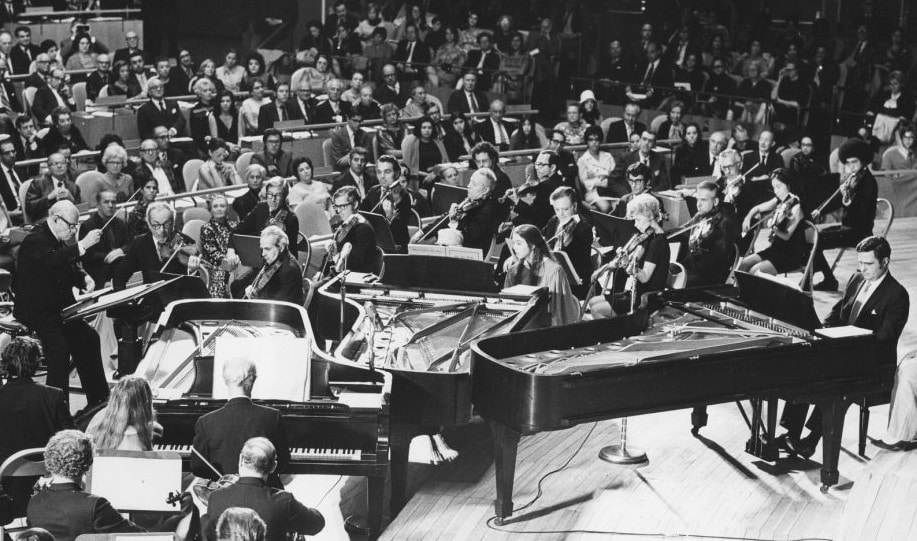New research: Opera in cinemas does not draw audiences to live performance
mainA fairly small sample polled by English Touring Opera and the Guildhall School of Music & Drama indicates that people who go to opera in their local multiplex are no more likely than before to buy tickets to the opera house.
Only 234 people were asked, so the sample may be written off as statistically insignificant in global – that is, Met – terms. But 85 percent of those who responded said after seeing the movie that they felt no greater urge to visit live opera. Click here for details.
So what has been gained by the main plank of Peter Gelb’s Met strategy?






Well there’s been more room to stretch out your legs in those cramped Met seats…
There is no live opera close to where I live, so I attend all the HD performances. The price is a fraction of what it would cost at the Met and the beauty of it is, that my friends in Michigan, London and Budapest are watching with me.
A poll of just 234 attendees in one city is surely far too small on which to base any findings. Yet one fact must surely be worrying as it ties in with comments on other threads here – that 81% of those polled were over 60!
What’s been gained for the Met? I wonder how much a cinema takes per ticket for any Met Live screening. Plus, 15% who didn’t say ‘no’ might have said ‘yes’ which = one or two more respondents at least who’d consider going to a live performance. These small ‘victories’ accumulated could lead to winning more audience for the art form.
Yes I am over 60, and no, attending Live in HD performances has not made me any more likely to visit live opera – a trip to the Met in New York would be wonderful, but living, as I do, in Scotland, it’s beyond my means. But my life has been made the richer by being able to see all the Live in HD performances at a price that I can afford, and in addition we in cinemas get the lively and absorbing behind-the-scenes glimpses and interviews with the Singers. Peter Gelb should be proud of the public service his company is providing by making these treasures available to people of all classes and income groups all over the world – this is an achievement in itself, and is of incomparable benefit.
But I do agree that there is a need for opera to come to the attention of younger people. If that is an explicit aim of the Live in HD programme, maybe there should be special recorded showings for young people, earlier in the evening, at reduced rates. At our local cinema the audience for the operas is easily distinguished from that for other movies by the greyer hair and the number of beige raincoats and tweed jackets on show. But it IS a problem, and since up to now opera has always been seen as elitist, maybe making it available to a wider audience may eventually yield ‘trickle down’ results. I do hope so.
My own introduction to opera as a child, though, was taking part in performances of children’s operas by Benjamin Britten – there’s nothing like the thrill of taking part to foster a lifelong interest in this all-encompassing musical experience. If the Met is really committed to encouraging younger people to learn to love opera, maybe they should be sponsoring children’s opera workshops, summer schools and camps, and should be commissioning new works written especially for children. Who knows, this might even encourage parents and grandparents to widen their tastes and venture into new listening experiences as well as continuing to love the classic repertoire.
Alison, a visit to the Met here in New York may not be feasible for you, but haven’t you any interest in seeing a live performance by Scottish Opera?
Maybe Mr Gelb’s legacy is that he brought an operatic experience to millions through the HD broadcasts. The broadcasts are excellent value and very well done and clearly popular. Live opera is not available in many areas and these broadcasts have filled a demand. For Peter Gelb, not such a bad legacy.
This should really come as little surprise. For years, orchestras in the U.S. packed audiences into increasing numbers of “pops” concerts, in expectation of those same folk showing up for the “real deal.” At least in my little corner of the country, it’s never happened.
This is a false “analogy”. Playing one kind of music in hopes of attracting audiences to another kind is obviously a highly questionable strategy. But the HD broadcasts show the same kind of operas that are being performed in opera theaters – so it makes good sense.
Surely the point is cinema screenings of opera do attract full houses. Certainly at my local Odeon in Kent this is the case. So its up to opera houses to capitalise on this. Perhaps by making seat prices more accessible would be a start
It sounds rather like the question was badly posed. Clearly many people go to the cinecasts of opera because they are not able or willing for financial or geographical reasons to go to live opera. Presumably they indeed would still be as unlikely to go to live opera after viewing it at the cinema, but that doesn’t mean they would be equally unlikely if their financial or geographical situation changed…
It’s an odd question for most respondents. Many will go to opera screenings because going to the “real thing” is impractical or unaffordable – not so much the tickets but maybe the travel, hotels, time and so on. Screenings increase the audience for opera overall – it’s not as if screenings have led to empty opera houses instead – and this we would surely agree is a good thing. Isn’t the point to bring top-quality opera to more people in an affordable and accessible manner? And that’s what these screenings do.